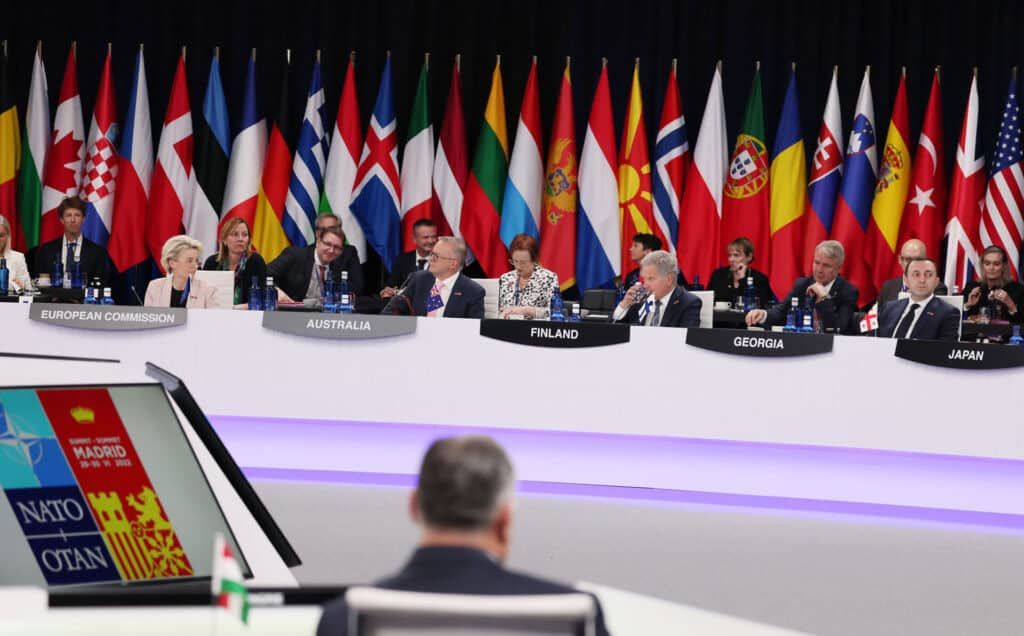If Finland joins NATO, it needs a new nuclear weapons policy
By Robin Forsberg, Aku Kähkönen, Jason Moyer | December 8, 2022
 Finland's President Sauli Niinistö attended the NATO summit on June 29, 2022 in Madrid. (Photo Prime Minister's Office of Japan / Kantei, via Wikimedia)
Finland's President Sauli Niinistö attended the NATO summit on June 29, 2022 in Madrid. (Photo Prime Minister's Office of Japan / Kantei, via Wikimedia)
As an aspiring NATO member, Finland must update its nuclear weapons policy. Nuclear weapons are an important pillar of the defensive alliance, which has the official position that for as long as nuclear weapons exist, NATO will inherently be a nuclear alliance.
In September 2022, Russian President Vladimir Putin threatened to use nuclear weapons, saying “In the event of a threat to the territorial integrity of our country and to defend Russia and our people, we will certainly make use of all weapon systems available to us. This is not a bluff.” Putin’s statement—and others—triggered a heated debate about nuclear weapons in Europe not seen since the darkest days of the Cold War. Even though Russia’s military doctrine prescribes nuclear weapons for self-defense, the doctrine is opaque and Putin is largely considered in the West as an unpredictable actor. As the invasion of Ukraine escalates and Russian losses multiply, there are widespread concerns that Russia might rely on its nuclear arsenal as a last-ditch method of coercion. These concerns happen as Finland contemplates its views toward nuclear weapons as a future member of the alliance.
After filing its membership application in May 2022, Finland is now in the midst of its NATO accession process, with only Turkey and Hungary’s approval remaining. In its application, Finland is not seeking any exemptions to its membership and is committing to the alliance fully. This has initiated discussions about its upcoming policy on nuclear weapons. On November 7, President Sauli Niinistö stressed the Finnish position: “Let me make it clear: even if we do not impose any restrictions on our membership of NATO in advance, Finland has no intention whatsoever of bringing nuclear weapons onto its soil. Nor have I seen any indication that anyone is offering them to us.” NATO’s two other Nordic members—Norway and Denmark—have prohibited NATO bases or nuclear weapons within their borders in peacetime. By applying for full NATO membership without any explicit restrictions, Finland allows itself the opportunity to chart its own decisions on nuclear weapons. But there is one caveat: Under Finland’s current national legislation nuclear weapons are illegal.
By joining NATO, Finland will be allied with countries that have nuclear arsenals—and are prepared to use them if deemed necessary. This aligns with the creed of the alliance: Nuclear weapons are a core component of NATO’s deterrence. This will be the new security reality facing Finland the day it joins the nuclear alliance. Yet, it has not been sufficiently debated what becoming a NATO member will mean for Finland’s approach to nuclear weapons. In part, this is due to interest in both Finland and NATO for a speedy and uncomplicated accession. But there is also a tradition of not debating national strategic security policies in public fora due to the Finns’ high trust in their national authorities. A healthy national debate, however, is needed to improve the understanding of nuclear weapons policies among the Finnish population and their potential impact on Finland’s security.
Finland’s nuclear weapons policy as a member of NATO should serve both the domestic and the international interests of the Finnish people. Finland has a history of a strong non-nuclear proliferation policy. In 1968, it was the first country to sign the Treaty on the Non-Proliferation of Nuclear Weapons (NPT) and has ever since shown strong support for multilateral non-proliferation and conventional disarmament treaties. But this dogmatism has somewhat wavered in recent years, even before Russia invaded Ukraine. In July 2017, when the United Nations Treaty on the Prohibition of Nuclear Weapons (TPNW, also known as the ban treaty) was signed by 122 countries, Finland chose to abstain from supporting the treaty as a result of changing national security priorities. Around that time, pundits in Finland believed that a vote for prohibiting nuclear weapons would not lead to the desired outcome, given the opposition of the five nuclear-armed permanent members of the UN Security Council to a vote for the treaty, which ultimately would water it down. Experts theorized at the time that Finland abstained from voting not to jeopardize its prospects of joining NATO.
When Finland joins NATO, its defense minister will have a seat in NATO’s Nuclear Planning Group, the senior body that discusses the alliance’s nuclear doctrine and sets policy. What the Finnish minister will do in this seat and what role it will assume in this alliance is a topic that has not yet been discussed or disclosed publicly and will require holistic, political, and military evaluation from the country’s political leadership. Having a seat in the Nuclear Planning Group will also give Finland’s government and military access to previously unobtainable operational information regarding the alliance’s nuclear arm. Discussing Finland’s revised nuclear weapons policy is important not to jeopardize the ethics of Finland’s continuous and long-standing support of disarmament and non-proliferation efforts. The debate should also be reflective of the people’s willingness to take part in NATO’s nuclear weapons exercises, activities, or planning.
As full ratification approaches, political parties and parliamentarians in Finland should engage head-on in a policy debate about nuclear weapons and NATO. In the spirit of the Finnish security policy tradition, national politicians should strive to find a consensus that would both endure the test of time and possible future political shifts. A public domestic debate diminishes the risk of political backlash against NATO membership and increases the Finnish population’s resilience in the long term. As Finland becomes a party to a nuclear alliance, it must begin the process of updating its nuclear weapons policy.
Together, we make the world safer.
The Bulletin elevates expert voices above the noise. But as an independent nonprofit organization, our operations depend on the support of readers like you. Help us continue to deliver quality journalism that holds leaders accountable. Your support of our work at any level is important. In return, we promise our coverage will be understandable, influential, vigilant, solution-oriented, and fair-minded. Together we can make a difference.
Keywords: Finland, NATO, NPT Review Conference, disarmament, nuclear policy
Topics: Nuclear Weapons

















Putin spoke recently about nuclear weapons:”Unlike the US, we do not put our nuclear weapons in other countries”. Our former president also not considered rational/reliable steward of nukes.
This is exhibit A in the appear for full disarmament. As Enrico Fermi said: If something has a statistical chance of happening, no matter how small, it will eventually happen” [paraphrased, from memory]
Where is the drive for disarmament over deterrence? If not here, where?
Nuclear weapons are evil, terrorist weapons of mass murder. They are grossly immoral and illegal. Finland should have nothing whatever to do with them.
With the G20 recently declaring that “The use or threat of use of nuclear weapons is inadmissable.”, perhaps Finland (and Sweden) could take up the issue of no-first-use once they take a seat at NATO’s Nuclear Planning Group table. Recalling that the G20 includes the European Union and that the majority of NATO members are also EU members, it would be nice to see some correspondence between what is said and what is done, no?
Looking at the actual numbers, one can say that the “vast majority” of NATO members are also EU members. The only NATO members that are not in either the EU or the G20 are Norway, Macedonia, Albania, and Montenegro. These countries should be encouraged to endorse the “inadmissibility” stance of the G20.